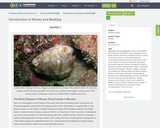29 Results
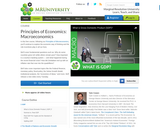
With this free video resource, students will explore the economic way of thinking, and the role incentives play in all our lives through engaging Hollywood production style videos.
Educators can use MRU's videos in a variety of ways, to include “flipping” the classroom, as study aids, supplementary material, concept reinforcement, or even as a full course offering.
In MRU's Principles of Macroeconomics course, we’ll cover fundamental questions such as: Why do some countries grow rich while others remain poor? How important is a country’s banking system — and what happened during the recent financial crisis? How did Zimbabwe end up with an inflation rate that rose into the quadrillions?
We’ll also cover important topics like the Federal Reserve, monetary policy, fiscal policy, the Solow Growth Model, institutional analysis, the “economics of ideas,” and more.
------------------------------------
What is Marginal Revolution University (MRU)?
Many of us can remember our first great economics teacher who fundamentally changed how we see the world. At MRU, we try and deliver that experience to millions worldwide through video.
Founded as a nonprofit in 2012 by George Mason University economics professors Tyler Cowen and Alex Tabarrok, MRU is building the world’s largest online library of free economics education videos -- currently weighing in at more than 800 videos.
- Subject:
- Economics
- Social Science
- Material Type:
- Full Course
- Homework/Assignment
- Lecture
- Lesson
- Lesson Plan
- Module
- Provider:
- Marginal Revolution University
- Author:
- Alex Tabarrok
- Tyler Cowen
- Date Added:
- 08/07/2017
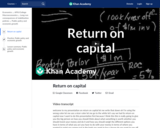
Introduction to return on capital and cost of capital. Using these concepts to decide where to invest. Created by Sal Khan.
- Subject:
- Economics
- Social Science
- Material Type:
- Lesson
- Provider:
- Khan Academy
- Provider Set:
- Khan Academy
- Author:
- Sal Khan
- Date Added:
- 07/27/2021

This seminar examines the global history of the last millennium, including technological change, commodity exchange, systems of production, and economic growth. Students engage with economic history, medieval and early modern origins of modern systems of production, consumption and global exchange. Topics include the long pre-history of modern economic development; medieval world systems; the age of discovery; the global crisis of the 17th century; demographic systems; global population movements; the industrial revolution; the rise of the modern consumer; colonialism and empire building; patterns of inequality, within and across states; the curse of natural resources fate of Africa; and the threat of climate change to modern economic systems. Students taking the graduate version complete additional assignments.
- Subject:
- Ancient History
- Arts and Humanities
- History
- U.S. History
- World History
- Material Type:
- Full Course
- Provider:
- MIT
- Provider Set:
- MIT OpenCourseWare
- Author:
- McCants, Anne
- Date Added:
- 09/01/2016
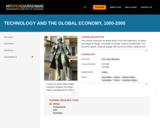
This seminar examines the global history of the last millennium, including technological change, commodity exchange, systems of production, and economic growth. Students engage with economic history, medieval and early modern origins of modern systems of production, consumption and global exchange. Topics include the long pre-history of modern economic development; medieval world systems; the age of discovery; the global crisis of the 17th century; demographic systems; global population movements; the industrial revolution; the rise of the modern consumer; colonialism and empire building; patterns of inequality, within and across states; the curse of natural resources fate of Africa; and the threat of climate change to modern economic systems. Students taking the graduate version complete additional assignments.
- Subject:
- Arts and Humanities
- History
- Material Type:
- Full Course
- Provider:
- MIT
- Provider Set:
- MIT OpenCourseWare
- Author:
- McCants, Anne
- Date Added:
- 09/01/2016
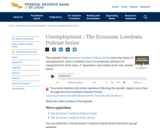
The fifth episode covers the basics of unemployment—how it is defined, how it is measured, and how it is categorized into three types. A "gameshow" quiz winds up the nine-minute lesson.
- Subject:
- Economics
- Social Science
- Material Type:
- Lecture
- Provider:
- Federal Reserve Bank of St. Louis
- Provider Set:
- Economic Lowdown Podcasts
- Date Added:
- 10/08/2014
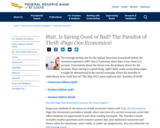
The average saving rate for the typical American household before the recession started in 2007 was 2.9 percent; since then it has risen to 5 percent. Uncertainty about the future was the primary driver for the increase. More saving is a good thing, right? Well, some economists argue it might be detrimental to the overall economy. Given the benefits to individuals, how could this be? The May 2012 issue explores this "paradox of thrift."
- Subject:
- Economics
- Social Science
- Material Type:
- Lesson
- Reading
- Provider:
- Federal Reserve Bank of St. Louis
- Provider Set:
- Page One Economics
- Author:
- Scott A. Wolla
- Date Added:
- 10/09/2014
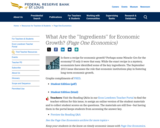
Is there a recipe for economic growth? Perhaps some Miracle-Gro for the economy? If only it were that easy. While the exact recipe is a mystery, economists have identified some of the key ingredients. The September 2013 issue discusses the role that economic institutions play in fostering long-term economic growth.
- Subject:
- Economics
- Social Science
- Material Type:
- Lesson
- Reading
- Provider:
- Federal Reserve Bank of St. Louis
- Provider Set:
- Page One Economics
- Author:
- Scott A. Wolla
- Date Added:
- 10/09/2014
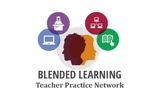
In this problem-based learning module, students will investigate the following question: Does the state of Ohio suffer from “Brain Drain?”If so why is this, where are people going, & what can be done to stop it?If not, what is keeping/bringing people here?After researching and learning about some of the push-pull factors that drove 19th century European immigration to the United States, student groups will be formed in order research, create, and share their findings to determine whether or not Ohio is a “push” or “pull” state.After the launch activity, students will spend the first two days gaining background knowledge on the historical components and content related to the topic. Beginning on Day 4, students will be grouped into teams to begin research and development of the “BIG IDEA” question of: Does the state of Ohio suffer from “Brain Drain?”If so why is this, where are people going, & what can be done to stop it?If not, what is keeping/bringing people here?Once the groups have determined their position on the problem, they will begin researching information to be able to share out their findings.The final products will be presented to an authentic audience consisting of District Administration (i.e., media relations), Local Administration (elected officials), and possibly, local Chamber of Commerce members
- Subject:
- History
- Material Type:
- Lesson Plan
- Author:
- Blended Learning Teacher Practice Network
- Date Added:
- 11/22/2017
